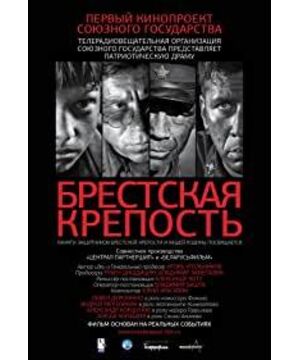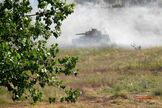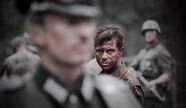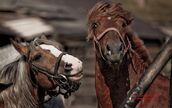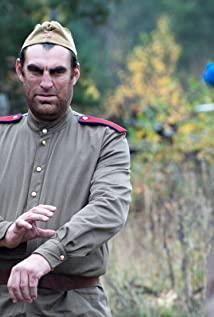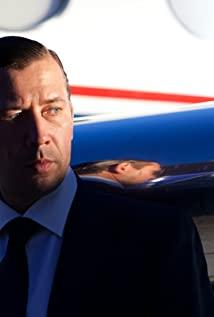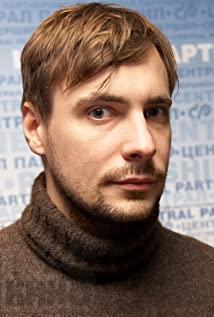The film tells the story of the Soviet people resisting the German attack in Brest in 1941.
Brest is located in Belarus. A strong fortress was built as early as the nineteenth century. Like London, Paris, Cologne, Petersburg, and Tianjin in history, they all first had barracks and then gradually developed into a city. The only difference is that with the development of modern weapons, the role of the castle in the cold weapon era has been greatly weakened, but until World War II, the main function of Brest was still a fortress to resist invading enemies.
The film begins before the German attack and tells us the real situation through the perspective of a child Sasha. On June 22, 1941, German fascists went to war with the Soviet Union, and the first to bear the brunt of Belarus was the Brest Fortress. Just one day before the attack began, people were still immersed in the life of singing and dancing, family reunion, dating, and movies. No one thought that war was about to come. The regiment’s political commissar Fuming told people: “Everything is calm in the fortress, and there will be no war.” Major Zavrilov was the only person who felt that the war was approaching and was investigated by the internal affairs forces for “spreading panic”. This may be the aftermath of the Soviet Union's 1937 purge. But even he didn't expect the war to come so quickly and suddenly. When a German plane dropped a bomb, a house collapsed, and people flee in panic, he said: "I have imagined war, but I have never imagined such a war. Everyone is waiting for it, but no one expected it. It will be so fast. Simple, straightforward, and terrifying." Although they didn't expect it, once the war came, people would not hesitate to take up arms, enter the fortress, defend the motherland, and defend their homeland.
The film captures three scenes from the fortress to describe this tragic and tragic defense battle. One is the Holm Gate guarded by the regiment’s political commissar Fuming; the second is the Terespol Gate guarded by the commander of the Ninth Border Post, Kizhevatov. These two gates are the key areas of the central castle; the third is the Kobrin Fortress guarded by Major Zavrilov, located to the north of the central castle. It was also a key area for the German offensive. Although only a few days ago, the defenders of the fortress have experienced countless sufferings. Lack of doctors, food, water, and failure to make a breakthrough. Soldiers fell at any time. After saving many lives, the old doctor was no longer able to support him. He said to Fuming, "I tried my best." He committed suicide with a gun. . A few people couldn't hold it anymore and surrendered with a white flag, while most people insisted on running out of ammunition and food.
In addition to these three scenes, it also shows the scene of the Soviet internal forces guarding the fortress. There is an episode in which German officers posing as the Soviet army order them to retreat immediately. The commander, Lieutenant Fat, had doubts about him, so he took off his boots and checked. The German officer immediately lost his temper and was shot to death in an attempt to escape. This also reflects a trace of cunning left over by Soviet internal staff after long-term internal review work. However, the internal affairs troops only persisted for a day before the entire army was wiped out.
The film was released in 2010. At this time the Soviet Union no longer exists, and Russian directors have inherited the shooting style of Soviet war films, which is to face the war directly. There are no grenades in the crotch, no arrogant beauties in handsome military uniforms, and no perverted hands to tear the enemy. It is not the use of war to talk about love, nor the use of war to show pain, but a calm description of the battlefield. The scenes of fighting and flying flesh and blood, with every detail on the battlefield, let us see the fighting character of the Russian nation and feel the brilliance of human nature.
We usually call the Russian nation a fighting nation. So how is the fighting nature of this nation reflected? They also know the preciousness of life, and they also cherish their own lives. However, once their homes are violated, they will desperately sacrifice their lives to defend their homes. This homeland means one's own family house and property when it is small, and its motherland when it is big. The ideological component of this is not strong. Stalin made such a speech during the parade on Red Square in 1941: "The war you are fighting is a war of liberation, a just war. Let our great ancestors-Alexander Nevsky, Dimitri Donskoy, Ku The heroic images of Zima Minin, Dimitri Pozharsky, Alexander Suvorov, and Mikhail Kutuzov will inspire you in this war! Let the great Lenin’ The banner of victory guides you!" The ancestors he mentioned were not Soviet heroes or Communists, but they were all defenders of the Russian motherland. After the Russian nation has experienced the suffering of enslavement for centuries, the motherland is extremely sacred in their hearts, and defending the motherland from oppression and bullying is the unchanging belief in the hearts of all Russians. This belief is extremely firm and unforgettable for all Russians. Regardless of whether the regime at this time is that of the Tsar, Kerensky, or Bolshevik. These are not important, the important thing is the Russian motherland. In the film, we see the internal affairs force whose original mission was to rectify people. They had cooperated with the purge and persecuted many innocent people, including Major Zavrilov in the film. But once the motherland is violated, they also fight to kill the enemy heroically, until the entire army is wiped out. At that time, the leader of Belarus, Denikin, was defeated by the Soviet regime and went into exile. He learned that Germany had invaded the Soviet Union. He immediately called on Russians all over the world to unite and fight for the nation. The same is true of Zavrilov in the film. He didn't care about the grievances he suffered, and went to the battlefield with a sinful body, fighting to the end. This is the national spirit of Russia.
We saw scenes like this one by one in the film. After the projectionist Korja was captured, the German army ordered him to collect the cap badges of the Soviet soldiers who died in battle. At this time, he saw the body of his girlfriend. In grief, he picked up a grenade, smiled and approached the German officer, died with him, and fell beside his girlfriend. At the last moment when the fortress was captured, Kizhevatov stayed to cover the retreat of her comrades and exhausted the last bullet. She took out the photos of her family from her pocket, looked at it affectionately, and waited peacefully for death. Sasha's neighbors and wife blocked the German army in the room. At the last moment, he and his wife kissed goodbye, shot his wife with one bullet, and left the other for himself. At the moment when the Germans captured Holm Gate, the Germans escorted the remaining Soviet soldiers out of the fortress. A German officer called: "Jews and political commissars stand up!" After hearing this, Fu Ming, the regiment political commissar, stood up and said calmly: "I'm the political commissar." He was shot immediately in front of Holm. From these scenes, we can see the attitude of the Russians towards death. They learned from the rescued pilots that the main force of the army was besieged, the airport was destroyed, and Minsk was occupied. At this time they already knew that "all possibilities are gone." Sooner or later, death will come. They did not run away for their lives in despair, nor did they impassionedly chanting slogans. Instead, they continued to hold on and calmly waited for the arrival of death. They felt that just as people would die naturally sooner or later, their fighting and devotion at this time was also a natural thing. They no longer have the slightest fear of death, this is what truly regards death as home.
75 years have passed since that war. And people's reflection on the war has never stopped. The war brought people not only the death of their loved ones, but also the destruction of their homes. The method of war is to kill. To a large extent, this kind of killing is not subject to legal sanctions or moral condemnation. Therefore, what the war destroys is the existing order of people, what is destroyed are all the beautiful things built by mankind for thousands of years, what is destroyed is the conscience of mankind. I used to think that the various evils that can only occur in barbaric peoples and uncivilized societies, such as the Japanese attack on Pearl Harbor and the September 18th Incident, such as the Nanjing Massacre and the Bataan death march. But in fact, the country that gave birth to Goethe and Beethoven is also full of wild beasts. Let's not talk about the massacre of Jews in Germany, just look at the undeclared war in Germany shown in the film, killing prisoners of war. At that time, for the survival of civilians, the Soviet commander ordered the old and weak women and children in the fortress to surrender to the Germans, but even so, these unarmed civilians were killed by the Germans in 1942. Think about the Soviet army in Berlin and northeast of our country, the US army in North Korea and Vietnam, both sides on the battlefield are like this. The word "best" is no longer sufficient to describe it. Once a man becomes a beast, he is worse than a beast. The Dong Shiro who wrote the diary, although he tried to do good later, when he was in Nanjing, wasn't he also a devil? In the general environment of war, the suppressed evil in human nature has been fully mobilized. This is how war encourages people to do evil, treating evil as normal and essential as dressing and eating. What kindness and what civilization are all left behind. As long as you are in this war, no matter what kind of person you were before, whether it is good, bad, barbaric, ignorant, or gentle, you will be involved in this evil wave. This is the sorrow of mankind.
In the film, in front of the post-war memorial, the elderly Sasha takes his little grandson in a memorial ceremony. He said: "I have to continue to believe now, and you have to believe that they are still alive. All the people I talk to you now, and those I don't know, they are still alive. Somewhere."
Are they really alive? Will people forget them? I have no idea.
My score: 7.5.
View more about Fortress of War reviews


